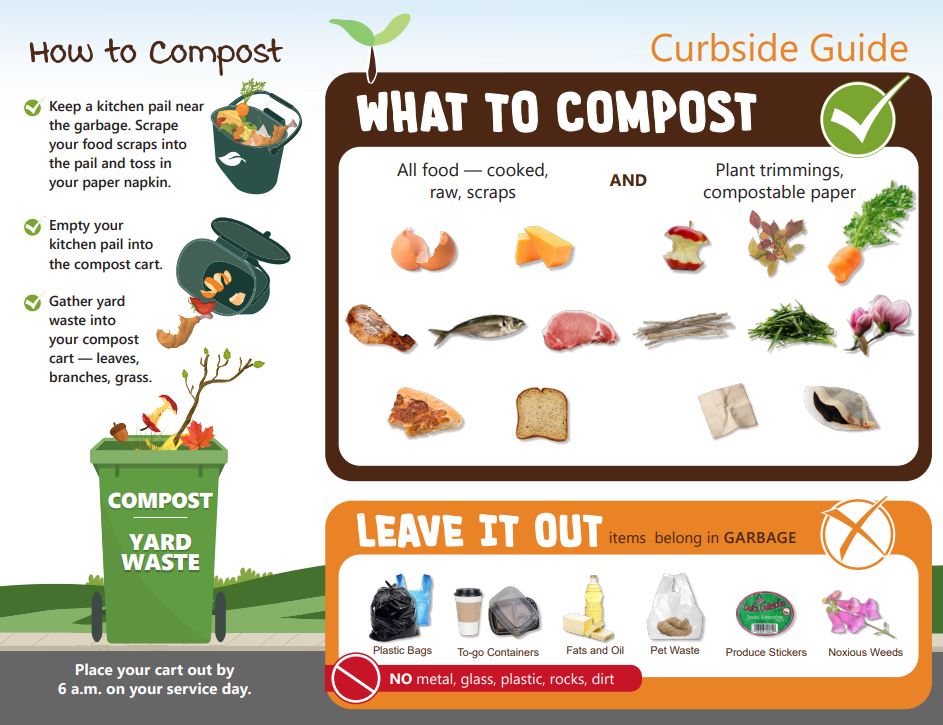Compost collection service is available
Curbside compost service is available to most homes in Kitsap County.
Service providers pick up compostable materials at your home to be composted on the Kitsap Peninsula.
All homes in North and South Kitsap are eligible for this service. Many Central Kitsap single-family homes are also eligible.
Search for your address to check for eligibility. If you're not yet eligible, sign up to be notified when services become available throughout Central Kitsap in 2026.
Guide to Curbside Compost

What goes in
Compost the following items:
Yard waste (leaves, grass, plant trimmings, and branches less than 3" wide and 4' long)
Food (meat, eggs, dairy, bread, grains, seeds, nuts, vegetables and fruit)
What stays out
NO plastic, including those marked "compostable/biodegradable/degradable"
NO shiny paper like cups, bowls, plates, and take-out containers
NO pet waste, litter, bedding, animal carcasses
NO rocks or dirt
NO lumber
NO fruit and veggie stickers and other labels
NO glass or metal
NO fats and oils
NO
noxious weeds (put in trash)
Take extra care before composting these items
Some items require extra preparation before composting. Follow these guidelines to prevent contaminating the compost with plastic. If you're not sure, do not compost it.
“When trash makes it into the compost bin, it can end up in the compost that is returned to our lawns and gardens. So if you don’t like it in your garden, don’t put it in your bin." - Jeff West, founder of Olympic Organics composting in Hansville and Bremerton

| Pizza boxes | Remove stickers and labels from greasy pizza boxes. If it's not greasy, it can be recycled. |

| Egg cartons, paper | Remove stickers and labels. If you can't remove the label, compost only the parts without a label.
|

| Shredded paper | Only compost plain shredded paper. Keep plastic out of your shredder. Envelopes with plastic windows or glossy paper mailers have plastic coatings. Recycle these instead.
|

| Tea bags | Remove staples from compostable tea bags. Only compost tea bags that feel like tissue paper. Many tea bags are made of plastic and not compostable. Plastic tea bags feel silky to the touch.
|

| Wooden chopsticks, popsicle sticks
| OK to compost
|

| Weeds | Some weeds are OK to compost, but
noxious weeds should be bagged and put in the trash to prevent the spread of these harmful plants. |

| Paper bags | Plain paper bags are OK to compost, but are best for the recycling bin instead. Remove stickers and labels before composting.
Optional: Use to line your kitchen food scrap bin.
|

| Compostable liner bags | You can use "BPI-certified" compostable bags to collect food scraps. Paper bags and newspaper are other great options for lining your bins.
Optional: Use to line your kitchen food scrap bin.
|

| Newspaper | Plain newsprint paper is OK to compost, but is best for the recycling bin instead. Do not compost glossy advertisements and inserts.
Optional: Use to line your kitchen food scrap bin.
|
Include the food
Some older compost carts are labeled "Yard Waste Only." This can be confusing. Service providers in our area accept food scraps along with yard waste in the compost carts, so be sure to include kitchen food scraps in your collection carts.
Noxious weeds, large branches, Christmas trees
Prevent harmful and toxic
noxious weeds from spreading. Bag them and put in the garbage.
Cut branches less than 3 inches thick down to 4 feet long. This size allows the compost process to break them down. The lid should be able to close.
Compost your unflocked Christmas tree. Cut it into 4-foot lengths before placing in your compost cart. The lid should be able to close.
Kitchen bins
Collect food scraps into a designated kitchen bin. Any sturdy container will work. Some people like small containers to empty frequently, while others like large containers that hold more scraps. You can prevent odor and fruit flies during summer months by storing your food scraps in the fridge or freezer.
Container ideas: Ice cream buckets, coffee cans or food storage containers. Other countertop compost containers are available online and in local home goods stores.
Avoid fruit flies
Make some easy changes to your composting routine during fruit fly season.
Store your food scraps in the fridge or freezer until collection day.
If your kitchen bin fits in your fridge or freezer, store it there rather than the counter.
Put food scraps in a
BPI-certified compostable bag or paper bag, or wrap the food scraps in newspaper.
Wash or rinse your kitchen bin after emptying it.
How composting helps
Keeps valuable resources out of the landfill. Around 42% of what the average Washington home trashes is organic waste that could have been composted.
Reduces energy and emissions from transportation. Garbage generated in Kitsap County travels over 300 miles to a landfill in Oregon, but composting is done locally on the Kitsap Peninsula.
Keeps nutrients available. Compost is shown to increase crop yields, clean toxic stormwater runoff, and repair damaged soils.
Reduces greenhouse gas. Low oxygen conditions in a landfill prevent food scraps from the normal rotting process. Instead, food scraps produces methane gas (a potent greenhouse gas).
Households with small amounts
Food scraps are heavier than other types of waste, so it takes lots of energy to transport them to the landfill. Sending even a small amount to the local composting facility makes a difference.
If your home doesn't generate much yard debris or food scraps, you can ask a neighbor to share the cost of a single compost cart.
Other composting options
Drop off clean yard waste at one of these
yard waste recycling facilities or start a
backyard compost pile or worm bin composter. Food waste is not accepted at drop-off facilities.

